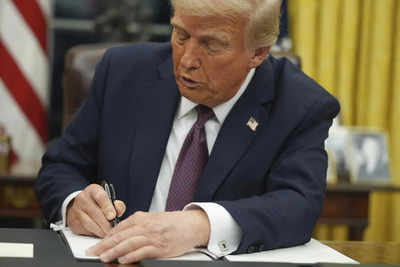In a sweeping crackdown on immigration, Donald Trump signed an executive order on Monday aimed at ending birthright citizenship for some children born in the United States.
This action challenges a deeply rooted American principle: the right to citizenship by birth, regardless of parentage. Critics warn that such a policy could create a permanent underclass, disproportionately affecting communities of color.
The executive order is expected to face legal challenges, as civil rights groups argue it contradicts the Constitution and over a century of legal precedent.
Here’s a breakdown of birthright citizenship and the implications of this controversial order:
What Is Birthright Citizenship?
Birthright citizenship is the legal principle of jus soli, or “right of the soil,” which grants citizenship to nearly everyone born on US soil.
The Legal Basis of Birthright Citizenship
The principle of jus soli has roots in English common law, which recognized anyone born within the territory as a natural subject.
In the US, this concept is enshrined in the 14th Amendment, ratified in 1868 to address injustices following the Supreme Court’s infamous 1857 Dred Scott decision, which denied citizenship to Black descendants of enslaved people.
The 14th Amendment’s Citizenship Clause states:
“All persons born or naturalized in the United States, and subject to the jurisdiction thereof, are citizens of the United States and of the State wherein they reside.”
This clause, along with related statutes, forms the foundation of modern birthright citizenship.
Legal Precedents for Children of Immigrants
In 1898, the Supreme Court ruled in United States v. Wong Kim Ark that children born on US soil to non-citizen parents are citizens. Wong Kim Ark, born in San Francisco to Chinese immigrant parents, was denied reentry to the US after a trip abroad. The Court upheld his citizenship, establishing a landmark precedent that remains foundational today.
Exceptions to Birthright Citizenship
While birthright citizenship applies broadly, there are rare exceptions:
- Indigenous people were excluded until a 1924 law granted them citizenship.
- In 2021, the Supreme Court ruled that people born in American Samoa, a US territory, are not automatically entitled to birthright citizenship unless Congress legislates otherwise.
- Children of foreign diplomats and hostile occupying forces are also excluded.
Birthright Citizenship Worldwide
Contrary to Trump’s claims that the US is unique in granting birthright citizenship, many countries in the Western Hemisphere, including Canada and Mexico, follow similar principles. However, birthright citizenship is less common in other regions.
What Does Trump’s Executive Order Do?
The executive order aims to deny citizenship to children born in the US if neither parent is a lawful permanent resident or citizen. It also prohibits federal agencies from issuing documentation proving citizenship for these children.
The policy targets children of both undocumented immigrants and those legally in the US on temporary visas.
Could Trump End Birthright Citizenship?
Experts say it is highly unlikely that birthright citizenship can be ended through executive order.
The 14th Amendment guarantees this right, and legal scholars agree that neither executive action nor legislation can override the Constitution. The Supreme Court’s decision in Wong Kim Ark is a cornerstone of this principle.
However, Trump’s order could provoke a legal battle that tests the limits of constitutional interpretation. Forcing the Supreme Court to reconsider the 14th Amendment appears to be a long-term strategy. Yet, overturning such fundamental precedent is improbable.
Amending the Constitution is another route but would require overwhelming political support—a highly unlikely scenario given the divisiveness of the issue.
Other Tactics to Limit Birthright Citizenship
Even if the executive order fails, the administration could pursue other strategies, such as restricting short-term visas for pregnant travelers to prevent them from giving birth in the US.
Trump’s attempt to reshape birthright citizenship raises serious constitutional questions and has ignited a fierce legal and political debate over the future of immigration policy in the United States.




